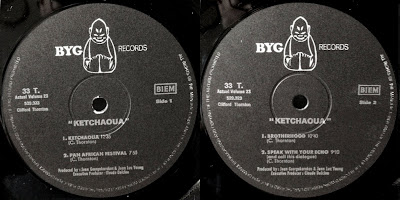Label:
BYG Records – 529.323
Series:
Actuel – 23
Format:
Vinyl, LP, Album / Country: France / Released: 1969
Style:
Free Jazz, Free Improvisation
Recorded – August
18, 1969 in Paris, France
Composed
By, Arranged By – Clifford Thornton
Coordinator
[Coordination] – Jacques Bisceglia
Engineer
– Claude Jauvert
Executive-Producer
– Claude Delcloo
Photography
By – Jacques Bisceglia
Producer
– Jean Georgakarakos, Jean-Luc Young
A1
- Ketchaoua ......................................................................
12:22
alto saxophone – Arthur Jones
bass – Beb Guerin
congas, gong, percussion – Earl
Freeman
cornet, congas – Clifford Thornton
drums – Sunny Murray
piano, bells – Dave Burrell
soprano saxophone – Archie Shepp
trombone – Grachan Moncur III
A2
- Pan African Festival .......................................................
7:50
alto saxophone – Arthur Jones
bass – Beb Guerin, Earl Freeman
cornet, congas – Clifford Thornton
drums – Sunny Murray
piano – Dave Burrell
soprano saxophone – Archie Shepp
trombone – Grachan Moncur III
B1
- Brotherhood ..................................................................
10:43
alto saxophone – Arthur Jones
bass – Beb Guerin, Earl Freeman
cornet – Clifford Thornton
drums – Claude Delcloo
B2
- Speak With Your Echo (And Call This Dialogue) ........... 9:05
bass – Beb Guerin, Earl Freeman
cornet – Clifford Thornton
23rd
volume in the BYG Actuel series; gatefold sleeve, 180 gram vinyl. This album
was recorded in Paris on August 18, 1969 by Clifford Thornton (cornet and conga
drums) with Grachan Moncur III (trombone), Archie Shepp (soprano saxophone), Arthur
Jones (alto saxophone), Dave Burrell (piano), Sunny Murray (drums), Beb Guerin
(bass), Earl Freeman (bass) and Claude Delcloo (drums).
"Clifford
Thornton was a player and a composer whose obscurity was offset by the high
esteem in which he was held by his fellow musicians... like Shepp, Thornton was
actively involved in advancing the ideology of the black movement... and all of his recordings are
intense and important about those matters that were close to his heart --
liberation, communication and unity."
_ Byron ColeyClifford Thornton's only Actuel date as a leader is, like many of the others in this BYG series, an all-star blowing session highly indicative of the times. For some, it will be difficult to tell whether taking credit for composing these pieces is a lost cause. This is some very free music and, save for a handful of scored passages, almost wholly improvised. A number of the scene's top players make appearances here in different groups.
Otherwise,
"Brotherhood," a piece for quintet, is performed by Thornton, Jones,
Guerin, Freeman, and this time, drummer Claude Delcloo, while on "Speak
With Your Echo" only the two bassists (Guerin and Freeman) accompany
Thornton's cornet. This piece in particular is especially enjoyable and
reminiscent perhaps of Arthur Jones' fantastic ballad, "Brother B,"
from his own Actuel LP, Scorpio. At times the ensemble pieces sound like a
Pan-African Morton Feldman, and at others, hazy, psychedelic post bop. Fans of
brooding and contemplative improvised music will find a great deal to enjoy
here. In fact, many would argue that this is the best LP under Thornton's
leadership...
1969's
Ketchaoua leaps through many styles in a way that reminds me of the Art
Ensemble of Chicago and also Archie Shepp in this era—Shepp appears on half of
the album. Side A contains two long
tracks that feature large ensembles and a lot of simple, interweaving
percussion. Both tracks gradually evolve
into brief periods of recognizable jazz styles before floating back into more
abstract terrain. The opening title
track might be the least prominent appearance from drummer Sunny Murray, who
blends into the massed percussion. The
two tracks on side B are opposite extremes, though both feature smaller
groups. "Brotherhood" draws
from New York energy jazz, with Claude Delcloo's percussion prominent in the
mix. "Speak with Your Echo"
ends the album with its sparsest arrangement, featuring only Thornton and two
bassists. The recording quality varies,
with the large groups sounding better than "Brotherhood", where the
explosive percussion reverberates awkwardly in a boxy room. Who cares, it still
sounds great.
Yes,
definitely raw, awesome, volatile and atmospheric. Brilliant!
If
you find it, buy this album!

.jpg)

.jpeg)






